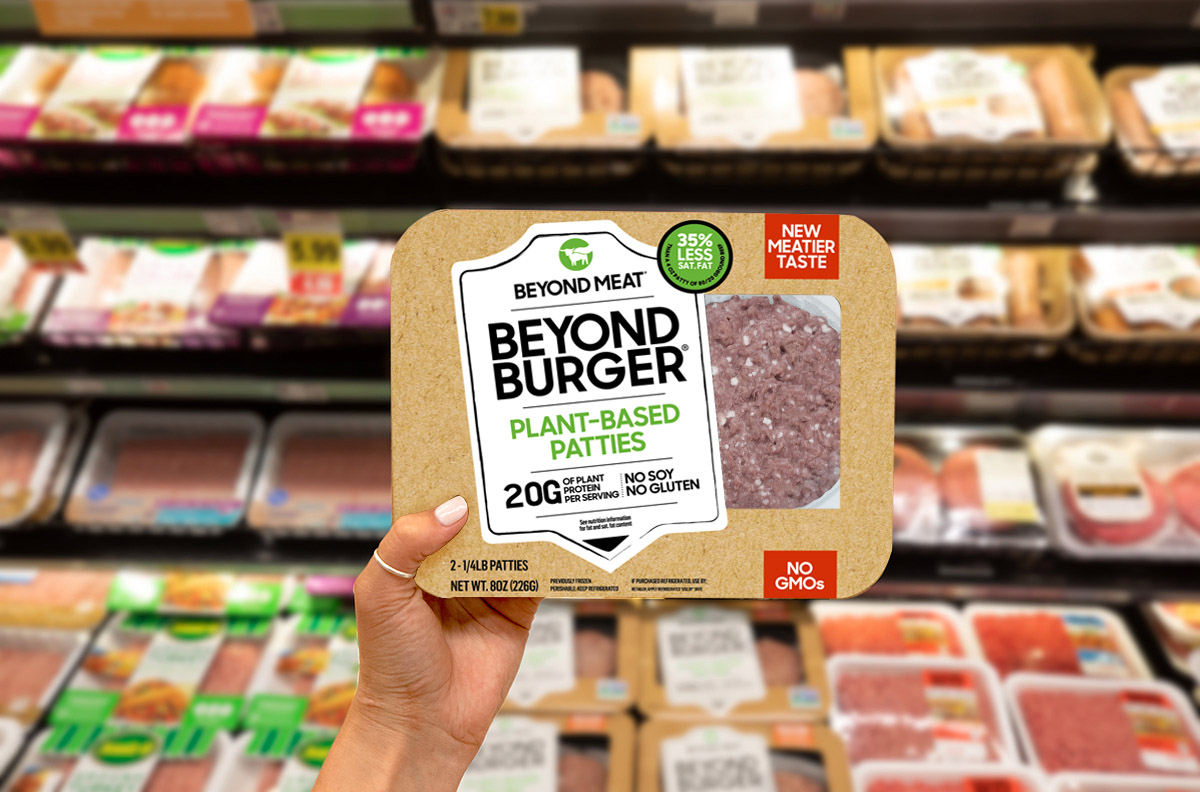Dunkin' Brands (DNKN +0.00%) is launching a new menu item across more than 9,000 stores, and it's good news for Beyond Meat (BYND 3.38%). The Beyond Sausage Sandwich was so successful in tests that Dunkin' decided to offer the sandwich nationwide.
Dunkin' is the latest restaurant chain to offer Beyond Meat products. In January, privately held Carl's Jr. ran a trial replacing the beef in its Famous Star burger. Eight months and 4.4 million meatless burgers later, Carl's Jr added the Beyond Famous Star permanently to the menu.
Other entrees include Beyond Tacos from Del Taco (TACO +0.00%) that launched in April, various menu items launched at Restaurant Brands International's Tim Hortons in May, and Beyond Chicken trials at Yum! Brands' KFC in August. Meanwhile, McDonald's is currently testing Beyond Meat burgers in Canada.
These distribution channels for Beyond Meat all came online just this year, not to mention the grocery chains now carrying the products. Predictably, these new channels sent this growth stock's revenue soaring. Revenue for 2019 is up 254% over the same period last year, which gives the impression that the business must be healthy. Yet it's important for investors to understand when Beyond Meat recognizes revenue to have a clearer view of how the business is doing.

Image source: Getty Images.
Say when
In SEC filings under Revenue Recognition, Beyond Meat states that revenue is recognized when it delivers products to its customers (restaurants and grocery stores). Therefore, to measure the health of Beyond Meat's business, investors need to focus not just on revenue growth, but on how well Beyond Meat products sell through to the end consumer.
Let's go back to Dunkin's Beyond Sausage Sandwich as an example. When Dunkin' decided to add this menu item, Beyond Meat filled inventory for 9,000 locations all at once and recognized that revenue right there. Revenue sharply increased virtually overnight. But Beyond Meat may or may not sustain that revenue growth. It all depends on how fast product sell-through is at Dunkin' and other channels.
So how is it selling?
Fortunately, Beyond Meat partners with several publicly traded companies, allowing a glimpse of consumer demand. First, let's note there's high industry confidence in the idea of meatless burgers. Only a handful of companies -- notably Chipotle Mexican Grill -- outright oppose Beyond Meat's products. Consider that Dunkin' tested Beyond Meat only in New York City, but from that minuscule sample size is now rolling it out nationwide. It's not unreasonable to assume most restaurants and grocery stores will at least experiment with Beyond Meat and its competitors in the near term. The general consensus is demand exists.
Some companies, like Del Taco, are already reporting Beyond Meat sales. The company reported third-quarter earnings in October. Comparable sales were essentially flat, but the average transaction price increased by 4.1%. Management attributed this increase almost entirely to the Beyond Taco menu, which accounts for 4% of total restaurant sales, or about $5 million quarterly.
KFC reported that a trial run of Beyond Chicken sold out in just five hours. But was that driven by fleeting curiosity or genuine demand? There's a reason to believe it's curiosity. Going back to Del Taco, Beyond Taco sales were 6% of the total back in the second quarter, seemingly indicating that sales are dropping now that the novelty has worn off.
Further, the Beyond Meat Tim Hortons experiment isn't ending well, with the coffee giant pulling the meatless menu items from most locations when they sell out. This will certainly be a drag on Beyond Meat's revenue and will be noticed in next year's second quarter when Tim Hortons' revenue gets added to the comparable sales base.
More channels needed
Beyond Meat's stock is down more than 60% from July highs, perhaps enticing investors to get in. But the company still trades for more than 22 times revenue, and barely turned its first profit in the third quarter. Even with the drop, this is still a high valuation. If revenue growth slows, the stock could fall further. But for revenue growth to stay in the triple digits going forward, it must add more distribution channels.
The failed Tim Hortons experiment is an especially hard blow. Tim Hortons' sister company is Burger King, and it opted for Beyond Meat's competitor Impossible Foods in its Impossible Whopper experiment. Perhaps parent company Restaurant Brands International was merely deciding between the two companies and has now chosen Impossible Foods as the ideal partner moving forward.
But there is still hope that major channels could be added soon. KFC is owned by Yum! Brands, which also owns Taco Bell and Pizza Hut. If the KFC experiment is successful, then perhaps Beyond Meat products would be rolled out across the nation and in the company's other brands. Either way, it's crucial for Beyond Meat investors to monitor.






